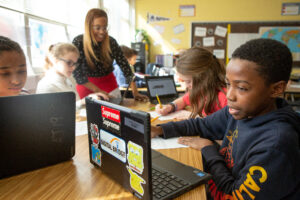Robust Infrastructure
![]()
Without the proper infrastructure, vital services for both student learning and student well-being are not feasible. When requiring students to access information outside of school for assignments, ensuring equity is key. The ability to access mental health services remotely is also vitally important.

Educational equity means that every student has access to the educational resources and rigor they need at the right moment in their education across race, gender, ethnicity, language, disability, sexual orientation, family background, and/or family income. This definition can be extended to include universal access to technological resources of all kinds, including those that support mental health and wellness needs.
Historically, social-emotional-learning programs were reserved for populations considered “at risk.” Learner-centered teaching requires us, however, to ensure equitable access to these programs and practices for all students. To do so, we must examine biases and interrupt inequitable practices to create inclusive, multicultural school environments that cultivate the interests and talents of learners of all ages from diverse backgrounds.
Shifts in curricula to reflect prioritization of competence over compliance, relationships and relevance over regurgitation and repetition, expose gaps in service and also provide the opportunity to better meet the needs of all students in a more systematic and equitable manner. Leveraging these possibilities through the use of technology requires a robust infrastructure at school and remote access outside of school.
Similarly, conducting focus groups and well-timed surveys with a wide variety of stakeholders, internal and external, will help identify infrastructure weak points and potential avenues for improvement, as well as inform future decisions. This could include surveys that specifically related to health and well-being and access to appropriate digital supports in these areas.
Reimagining schools that integrate social, emotional, and academic development requires resources—people, time, money, and the proper infrastructure. We must acknowledge and then actively address the under-resourcing of marginalized students. To cultivate and foster equitable opportunities, ensuring adequate and equitably resourced schools is essential. Further, making these opportunities available to holistically support each learner exemplifies and underscores the importance of infrastructure.
- How are resources (technological and curricular) allocated to promote equity?
- Are opportunities of access available in
- classes (general curriculum, at-risk, remedial, advanced, etc.);
- devices (in-class, take-home);
- internet (in-class, on buses, take-home); and
- Special Education tools?
- Are opportunities of experience available in
- classes (general curriculum, at-risk, remedial, advanced, etc.);
- content;
- demonstration; and
- assessment?
- How are digital tools leveraged to support student health and well-being?
- How is access provided and prioritized for traditionally marginalized groups?
- Which students do not have the necessary home internet access? Is there a plan to support these needs?
Highlighted Resource
Cultivating Culturally Responsive Ideals in Classrooms
A meaningful conversation is a discussion that you facilitate with your students that intentionally brings in topics of social justice, race, and identity. They typically begin with an opening question that drives the conversation. This opening question should be authentic, relevant, and grounded in current topics, yet broad enough to spark many facets of discussion. If you employ this practice, it is paramount that you hold these conversations all throughout the year—these topics should always be at the forefront of people’s minds!
Implementation Guide
Consistent and Ongoing Communications
The effective use of technology provides tools, resources, data, and supportive systems that increase opportunities for teaching and learning.

This guide is generously supported by GoGuardian, Pear Deck, and Edulastic.